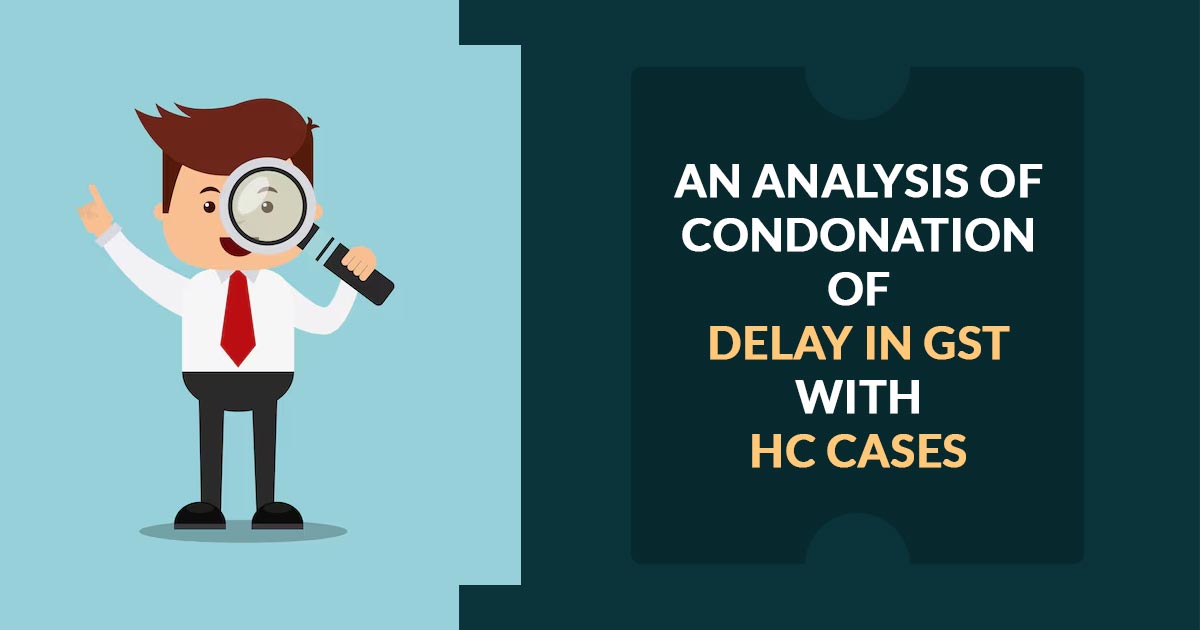
The blog discusses the legal elements for the condonation of the delay in the petition of GST, examining the related case laws and furnishing a complete technical discussion on the case. GST tax litigators are under pressure to furnish their appeals to the first appellate authority.
It is expected that distinct appeals shall be filed beyond the initial due date, accompanied by requests for the condonation of the delay within the three-month permissible duration.
Legal Structure on Condonation of Delay in GST Appeals
For filing an appeal the statutory period is 90 days from the date of communication of the order, under the Central Goods and Services Tax (CGST) Act, 2017. The appellate authority is empowered to condone delays up to a further 1 month if adequate cause is displayed. Beyond these 3+1 months, condonation of delay is not explicitly given under the CGST Act, directing to legal challenges and judicial interpretations.
HC Cases Examples Reinforcing Condonation of Delay in GST Appeals
The issue of condonation of delay in GST appeals has been addressed under various High Courts, frequently gathering the principles of justice and fairness to ensure that appellants are not excessively penalised for procedural lapses. Certain notable matters:
Calcutta HC Case: Arvind Gupta Vs Assistant Commissioner of Revenue State Taxes
Similarly, the Calcutta HC has stressed that the appellate authority has the inherent authority to condone delays beyond the legal limit when the situation warrants it. The court found the appellate authority’s refusal to condone the delay of more than four months to be flawed. It directed a reconsideration of the appeal on its merits, thereby highlighting the judiciary’s inclination to prioritise substantial justice over procedural technicalities.
- S.K. Chakraborty & Sons – The court carried that Section 107 of the CGST Act includes the applicability of Section 5 of the Limitation Act, 1963. Therefore, the appellate authority is authorised to consider condonation of delay beyond the stipulated period, aligning GST law with broader principles of justice glorified in the Limitation Act.
- Kajal Dutta (2023) – Because of the illness of the applicant the appeal was filed late, supported by a doctor’s certificate. The court condoned the delay, repeating that genuine medical emergencies constitute sufficient cause for delay.
AP HC Case: Shaik Abdul Azeez Vs State of Andhra Pradesh
The Andhra Pradesh High Court considered that while the appellate authority cannot condone delays beyond the statutory period u/s 107 of the APGST Act, exceptional possibilities warrant judicial intervention. To condone the delay the court practiced its writ jurisdiction, emphasizing that procedural rules must not overshadow the right to a fair hearing.
- Abiswathika Infra (2023) – The same case comprises the GST registration cancellation of the applicant. Provided the non-availability of the GST Tribunal the court ordered reconsideration, implicitly acknowledging the requirement for flexibility in procedural timelines in the absence of sufficient appellate forums.
Madras HC Case: M/s Sathya Furniture Vs Assistant Commissioner
The court condoned a 1 week’s delay caused by a mistake of an accountant, emphasizing the assessees must not suffer because of the errors by their representatives. The very decisions align with the border judicial strategy of ensuring fairness and justice over rigid adherence to procedural deadlines.
- Great Heights Developers LLP (2024) The delay has been condoned by the court where the appellant has shown that valid mitigating the situations, like a serious medical condition. The very case supports the principle that real efforts must be accommodated to streamline an effective process of adjudication.
HP HC Case: Sunil Kumar Vij Vs Union of India
The appeal rejection for a one-day delay has been criticized by the court terming the same a hyper-technical. The matter shows the disapproval of the judiciary for excessively rigid interpretations of procedural rules that interfere with justice.
Allahabad HC Case: M/S Ramji Kirana Store Vs State Of U.P.
The court discovered that the assessment orders passed without allotting a hearing to the taxpayer and the appellate orders dismissing the late condonation applications without consideration are unsustainable. The matter was remanded for adjudication, stressing the importance of due process and fair hearing.
Examination of GST Cases
The examination of these legal cases shows that the courts have consistently been willing to make allowances for delays in GST appeals, as long as there are valid and substantial reasons for the delay. The courts have frequently referred to the principles outlined in the Limitation Act, of 1963, which permits the extension of time if the appellant can prove a genuine reason for the delay.
Section 5 of the Limitation Act, of 1963, plays an important role here, as it grants courts the discretion to condone delays when “sufficient cause” is exhibited. The same principle has been read into the GST framework via different High Courts, even after the rigidity of the CGST Act’s timelines.
In addition, the courts have acknowledged the principle of substantial justice, which asserts that procedural errors should not take precedence over the fundamental right to a fair hearing. This principle has informed judicial interpretations, guaranteeing that individuals appealing a decision are not denied their statutory right to appeal due to unavoidable delays.
Conclusion: The rules regarding the extension of time in GST appeals strike a balance between respecting procedural deadlines and ensuring that justice is served. Tax litigators should be familiar with these legal precedents and underlying principles to effectively argue for an extension of time in deserving cases. It’s important to file appeals promptly as the deadline approaches, but also to be ready to support any requests for an extension with strong legal and factual arguments.









